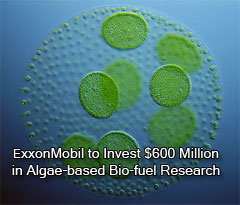Though it has received much less attention than “switchgrass” and other approaches to bio-fuels, algae offers significant potential as an alternative energy source.
That potential was underscored with the news last week that oil giant ExxonMobil was going to invest $300 million in a nascent algae-based bio-fuels company started by well-known entrepreneur Craig Venter. In addition, ExxonMobil announced it was going to invest another $300 million in its own internal R&D related to algae-based bio-fuels.
Under the right condition, algae can be coaxed to create “lipids” that can then be relatively easily converted into diesel fuel, gasoline, and possibly even advanced hydrocarbons (used to manufacture plastics and chemicals).
ExxonMobil made the investment in a company called Synthetic Genomics, which was started by Venter, who in the 1990s gained fame as the founder of Celera Genomics, which completed the public project to sequence the human genome. ExxonMobil will invest the money over 5-6 years, and says its internal research will be “complementary.”
Algae can be grown using ocean and waste water on land where traditional crops cannot flourish. They are biodegradable, and although they cost more per pound, algae can yield over 30 times more energy per acre than other, second-generation bio-fuel crops like soybeans and corn. Algae can also reduce carbon emissions because during photosynthesis they capture carbon dioxide and sunlight and convert it into oxygen and biomass.
There are other advantages to algae as a bio-fuel. By the barrel, algae fuel provides three to four units of energy for every unit used to make it, giving it a ratio that approaches petroleum's 5-to-1 level of efficiency. The ratio for making ethanol from corn is a mere 1.2 to 1, according to some studies. Even making ethanol from cellulosic plants like switchgrass, researchers can achieve only a 2.5 to 1 ratio, according to a recent article in MIT’s Technology Review.
There are three common approaches to developing the algae. The first method is an “open-pond system” that grows algae out directly in the sun. The second technique for growing algae is a “closed, sunless system” that grows algae in fermentation tanks, feeding it carbon from sources like sugarcane. Finally, a “closed-system bioreactor,” which uses light to support a biologic active environment, is used to grow algae. In one study (1978 to 1996), NREL’s (National Renewable Energy Laboratory) Aquatic Species Program concluded that open ponds are the optimal economic design and used open ponds for its experiments and economic models.
 There are challenges, however – one of which is the sheer space required to produced and harvest algae production. The United States Department of Energy, for example, has estimated that algae fuel would require at least 15,000 square miles to replace all current U.S. petroleum fuel requirements. (This is a few thousand miles larger than the State of Maryland.) There are challenges, however – one of which is the sheer space required to produced and harvest algae production. The United States Department of Energy, for example, has estimated that algae fuel would require at least 15,000 square miles to replace all current U.S. petroleum fuel requirements. (This is a few thousand miles larger than the State of Maryland.)
Many energy experts, however, are bullish on algae’s potential.
One of them is Dr. Emil Jacobs, Vice president of research and development at ExxonMobil Research and Engineering Company, who says: “Algae have the potential to produce large volumes of oils that can be processed in existing refineries to manufacture fuels that are compatible with existing transportation technology and infrastructure.”
Do you the future of bio-fuels will be algae? What are the pros and cons versus other sources such as switch grass? Let us know your thoughts at the Feedback button below.
|